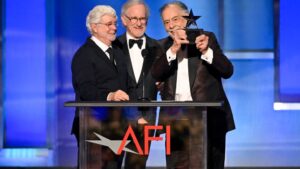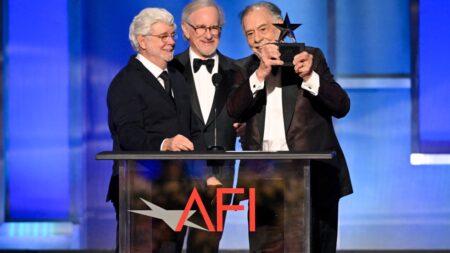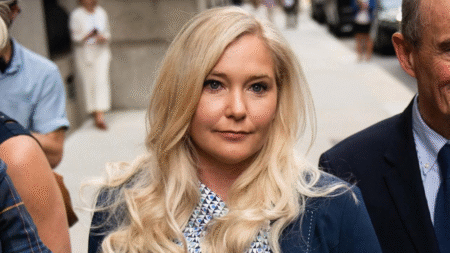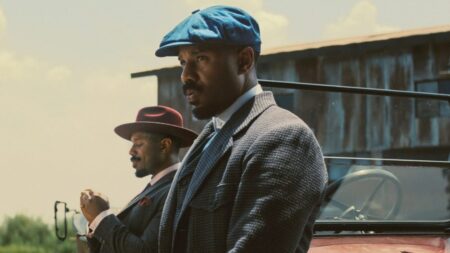It’s easy to see shadows of David Cronenberg in his newest film, “The Shrouds,” now playing in theaters via Sideshow and Janus Films. Vincent Cassel stars as Karsh, a Canadian tech guru who creates a graveyard where you can watch your loved ones rot in their coffin in real-time via an app. Between Karsh’s styling — which looks very similar to Cronenberg’s signature shock of hair and minimalist chic wardrobe — and the fact that Cronenberg wrote this film after his wife’s passing in 2017, many critics took this to mean the work was largely autobiographical. Cronenberg’s rejection of the notion was just one of the first surprising musings from a discussion with Variety about his approach to art, including his consideration of the audience, embrace of technology and rejection of genre.
So many of your movies feel like they have personal elements. “The Shrouds” seems like one of your most personal works. Did you have any anxiety about putting so much of yourself in this film?
No, not really, because although the impetus to do this film came from the loss of my wife and my reaction to that, once I start writing the screenplay, it becomes fiction and I’m creating fictional characters who are not me. Karsh is a high-tech entrepreneur, which I am not. He owns the cemetery and a restaurant and so on and so on. At that point, I’m leaving the real people and the reality behind and creating a fictional world. I wasn’t worried about it — it was not like I was defaming anybody and I had to worry about that or anything. So the answer is no, in this case.
Now that the film is out in the world, do you think about death differently than when you first started making it?
The answer is no, although I did do a lot of research into burial customs around the world because, at a certain point, I was thinking of this as a Netflix series. Therefore, I had to think about what would happen in each next episode, and Karsh would go to different countries trying to establish his kind of high-tech cemeteries, and countries maybe would be hostile to that for religious reasons or economic reasons or political reasons. So I did a lot of research and it’s astounding, the infinite variety of burial customs and rites and so on that exist in the world. But none of them caused me to rethink my approach to life or death at all.
Some filmmakers obsessively consider how audiences will receive their films and how they will react to certain beats or ideas. Others just focus on putting their vision out there and say they don’t think about the audience at all. Where do you fall between those different philosophies?
I certainly think about the audience, but in a very personal, reflective way. I’m not manipulating the way Hitchcock used to consider himself as a puppet master, pulling the strings of his audience. It’s a different relationship. I’m saying, “These are some thoughts I’ve had. These are some characters I thought were interesting. I think their life, as we look at them in the movie, takes us to some interesting places where we might question things and think about things. I’ve been having that experience and I’m inviting you to come along with me and see what you think about this.” So I do think about the audience, but I don’t think about it as a puzzle that I’m challenging the audience to solve. Sometimes that means my narrative structure is not traditional. It’s not the old Victorian idea of the well-made play, where there are all kinds of strings untied and then tied up neatly at the end. I think some people may find it frustrating that my movies do not have a conventional structure mostly, but I’m more interested in the movie reflecting the reality of life as it’s lived in the human condition, rather than the artificially neat, puzzle-solving structure.
Your filmography is so indelible. Is it sometimes challenging to release a film knowing that people are going to be watching it in relation to your full oeuvre versus a unique new work?
I don’t really think about my other movies and how people will relate to them. If I did that, I’d probably be paralyzed and not be able to make a movie. There are too many ways to think about it, and how can you anticipate how people will react? I know that in each movie there will be connections to my other films because it comes from my sensibility. But thinking about my other movies doesn’t give me anything creatively — it doesn’t give me weapons or instruments to work with. So I do approach each movie as though it’s the first one I’ve ever made and that I don’t have any other movies to think about. When the movie comes out, of course, people — especially critics — are making these connections, and I can appreciate some of that in retrospect, but it’s nothing that I need or do while I’m making a movie. I just don’t think about it.
When developing a new story, do you tend to think of the characters first, the inciting incident, the genre or something else?
I don’t think about genre at all. To me, genre is a marketing question. You know, “How do we sell this movie?” Let’s sell it as a horror film, you know, or let’s sell this as a gangster film. But, once again, that’s nothing that gives me anything to work with as an artist. So my solution to that is I just don’t think about what genre might be considered or not considered. I’ve made movies like “Dead Ringers” or “Naked Lunch,” which…what genre are they in? There isn’t one. So it’s not an issue for me. A lot of critics wrestle with that question of genre: “Is this a betrayal of the body horror genre?” I don’t even know what the body horror genre is, frankly — it wasn’t my idea, it’s not something I came up with myself. But if it helps people to access the movie or process the movie, I don’t mind. But once again, it’s not something that I factor into when I make a movie.
Vincent Cassel in “The Shrouds.” © Janus Films /Courtesy Everett Collection
Courtesy Everett Collection
During your career, you’ve been attached to many projects that have taken a turn in the development process and not worked out, including directing projects like “Top Gun” and “American Psycho.” Are there any films that didn’t work out that now you look back and you think, “I’d have loved to take my shot at that one?”
You become quite rational and pragmatic about it. There’s always one that gets away, and sometimes you say, “Thank God I didn’t get involved in that, because I can see that it would have been a disaster for me, but at the time I was being seduced by the idea of it.”
At one point, I was talking to MGM about doing a movie based on a Robert Ludlum novel called “The Matarese Circle.” I talked to Tom Cruise and Denzel Washington because those were going to be the stars. I spent some time with Tom, and we got along very well and he was very excited about the screenplay that I wrote based on that novel, and he was very excited about playing that character. But then MGM went bankrupt, so the movie never got made and nobody ever came around to thinking about it again. It would have been a very high-profile spy movie. Would it have been good? Would it have been interesting? Well, the script was pretty good, but who knows? Do I regret it? Well, it’s not exactly regret. I think about it.
Which of your films do you feel would be ripe for rediscovery?
That’s happening with a lot of my films, actually, and even to the extent of some of them being remade, like “Rabid.” We showed at the Venice Film Festival a few years ago the new-at-the-time, 4K restoration of “Crash.” It was very interesting to have a very big, very young audience in “Crash.” And unlike the first screening of it in Cannes in the 80’s, the audience was not at all scandalized, they weren’t outraged, they weren’t shocked. They hung around for the Q&A and it was very sweet and very intelligent. It was very different in that sense, the rediscovery of that movie for that audience. Whether it went beyond that with the sale of the 4K version or not, I have no idea.
You’ve done some recent interviews where your comments about using AI in film work and shooting on digital surprised some creatives. Why do you think you are so willing to embrace new technology at a time when other filmmakers might not want to, or are obsessed with the idea of reaching back to the past by shooting on film?
I don’t know. I think some directors feel that they are plugging into a source of power of the past of Hollywood to work with film as opposed to digital. But I think it’s all delusional, frankly. I got an e-mail from the director of photography I’ve worked with on the last two movies, who said that there was a back-to-back screening of different kinds of scenes, day and night, between 35mm Kodak film and digital version of film. He said they were identical, you could not tell the difference. To me, film is a nightmare to work with. If you’ve ever edited film, splicing and so on is not great. We have nostalgia for film because great films were made on film, but that doesn’t mean that the medium itself is great. It was very primitive and digital is so much better.
For a filmmaker, control is everything. It’ll be able to have control over the lighting, to relight a scene after you’ve shot it. You can do that on digital. You can’t really do that with film. So to me, there is no reason, even financially, to shoot on film now. Shooting on film is now a financial burden in terms of your budget, because so few labs exist now that can process it. I was talking to some director who had to send the film from LA to Mexico because that was the only place where there was a lab that could process that. It’s sort of a pursuit of a phantom, to feel that you’re connecting to something special with film. You’re not creating a film that actually looks different, though, and to me, that’s the bottom line.
Could you tease what project you’re working on next?
I’m talking to Robert Lantos, who’s a Canadian producer who produced “Crimes of the Future” and worked with me on some other films, so we know each other very well. We’re talking about possibly doing a movie based on my novel “Consumed.” I’ve written one novel, and he’s wanted to turn that either into a series or a movie for some years, and he’s kind of convinced me that it would be good if I gave it a shot. So I’m working on a script for my own book, which is quite interesting. I’ve never done that before. I’ve only written one book, so it’s a new experience. The question is whether the script will turn out to be something that we want to do. Will it be a script that could be financed? It wouldn’t be cheap, it takes place in four countries, so of course we can’t tell right now. But that’s where it might go.
Watch the trailer for “The Shrouds” below.
Read the full article here








